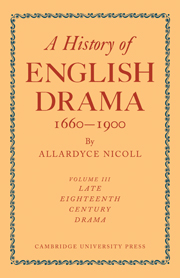Chapter One - THE THEATRE
Published online by Cambridge University Press: 05 March 2012
Summary
Introductory
It is not to be denied that the great mass of late eighteenth century plays make today but dull reading. Countless are the trivial farces where a fair Clarissa or a fairer Celia is about to be married to an odious Squire Badger or a detestable Sir George Trifle and where a faithful Townly or a fascinating Lovemore arrives disguised as serving-man or as country clown to rescue her from the hated toils. Countless are the artificial and absurd comic operas; countless the weary tragedies and the lachrymose comedies of the period. There are, on the other hand, not a few considerations which must give us to pause ere we rashly dismiss this era of dramatic activity from serious investigation. After all, much of the minor work of even the most glorious theatrical decades has been of poor quality. Hardly anyone but the most blindly enthusiastic can profess to see in the lesser Elizabethan comedy and tragedy elements of greatness, and in our own days, with all the revival in the theatre, there is a vast amount of trivial, inartistic and uninteresting work produced. A period of literature cannot be judged on the total mass of its activity alone. It may seem at first as if Sheridan and Goldsmith, the twin stars which shine in the darkness of this era, stand entirely alone, and, in so far as no other dramatist quite reached their brilliance, this supposition is true; but there are many beside those two who came near at least to their mastery of dramatic dialogue and of dramatic situation.
- Type
- Chapter
- Information
- A History of English Drama 1660-1900 , pp. 1 - 48Publisher: Cambridge University PressPrint publication year: 1952



